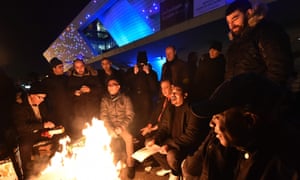
Bill Moore’s walkie-talkie app Zello has mostly been used for people struggling against repressive regimes in places like Egypt, Turkey, and Bahrain. In South Africa, communities use it as a 911 system. During anti-government protests in Venezuela, activists turned to Zello.
But hasn’t been that popular in the US, Moore said, adding that the US isn’t even in the top market for the app’s 90 million users. Except among one funny group:Uber drivers.
“For them, you know, I think it fulfills a basic human need, which is companionship,” he said. “Uber drivers are just out there on their own trying to make their way in the world without context or community. That doesn’t lend itself to human flourishing.”
“Then, here, all of a sudden they’re part of a group. They’re talking.”
When your boss is an app without so much as a telephone number to call, work can be lonely. As Uber has grown to become the most valuable private company in the world, drivers have begun scratching out a social world around their disembodied workplace. They’re on Zello to chat with each other while they drive. They have private Facebook groups. Drivers review their local Uber branch on Yelp. And probably more than anything: they’re on UberPeople.
UberPeople.net is a rudimentary and extremely popular message board for Uber drivers that serves as a sort of public water cooler. The drivers troubleshoot insurance plans and used cars, try to read the tea leaves on Uber announcements, commiserate when they all wake up to a new (usually unannounced) fare cut, or celebrate successful days of catching high surge fares. They plan mass protests (of the sort that have hit major American cities this week) and they talk about the details of class action lawsuits. Its users have written more than 750,000 posts so far.
The founder of UberPeople.net prefers to remain anonymous and goes by simply “the Admin”. It’s not clear if the Admin is male or female, a union representative there to foment anger or even perhaps a savvy Uber PR person hoping to penetrate the enemy. But most Uber drivers refer to the Admin as “him” and note he claims to be a disenchanted Uber driver. He responds to inquiries only by email:
“I started driving as soon as my city offered ‘rideshare’. Quickly I realised that the business was something altogether new in the world – the way they signed up thousands of drivers to work for them without hardly any personal communication,” he wrote.
He continued: “Uber is neither ‘rideshare’ nor the ‘sharing economy’. It’s the modern face of capitalism.”
If Uber is the harbinger of what’s coming in the future of work – a world of uninsured, on-demand labor that can be hired, hailed, and fired via smartphone app – then Uber driver communities can serve as a case study.
Sanjay Malhotra, who says he registered as an Uber driver but drives a cab, is one of the most vocal members of UberPeople and serves as its de facto spokesman. Reporting to an app is lonely, and slightly absurd, he said.
“Even if you don’t think your boss is an app, you’re being controlled by the app. You’re being manipulated by the app. It’s your boss,” he said. “And Uber is ‘lone wolf’ kind of work. You get in your car and you start driving. You don’t have anyone to talk to about it.”
He views this as a kind of disembodiment. “Here is a $60bn company, the most valuable private company in the world, yet there is no fricking phone number for a driver to call?”
Uber representatives firmly identify their company as a technology company, simply “a platform” to connect willing drivers with willing riders. In that scheme, the less human interaction from the company’s end, the better.
Michael, an active Uber driver who asked his last name be withheld lest Uber deactivate him, goes to UberPeople to help coach newer drivers.
“Unless you connect with other people who use Uber, there are things you would just never be aware of. The app isn’t self-explanatory. God forbid they should send out a user manual,” he said. “The most recent update – they add a little traffic light in the corner – had no explanation of what it is, as far as I could tell. Is this a pause to go to the bathroom? No one knew.”
He says Uber has been known to deactivate those who post their personal information on driver blogs; at a recent protest, a young Uber employee was shooting video of the cars. “It’s overzealous young people who come from a data-driven world. They don’t even know what they’re doing is unethical.”
An Uber spokesperson contacted for comment disagreed that working with the app was lonely, adding there is something inherently social about driving people. The spokesperson said that the company runs 100 in-person driver support centers and hosts occasional meet-ups.
Neither those support centers nor Uber itself have a phone number available to drivers, the spokesperson confirmed.
The Zello app has several channels devoted to Uber. To speak, users press a big button in the middle of the screen and have 20 seconds to speak before someone can interrupt them. Moore says he’s noticed drivers talk about traffic but conversation usually moves quickly into personal discussions.
In many ways, it works just like a traditional dispatch service: three quick beeps when someone walkie-talkies in, and then a man’s voice comes on the line, crisp but with the echo that comes from a car speaker phone: “The East Side is booming.”
A few minutes later, there’s a series of rapid exchanges between two drivers who seem to be flirting.
Then three beeps: “I’ve been out at the airport for five or ten minutes now but I haven’t had anything.”
There’s a garbled response about hauling ass, and someone laughs.
[“source-theguardian”]









